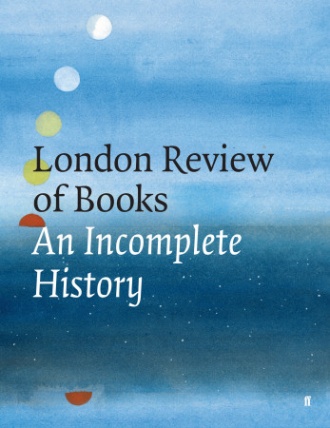This is the last article you can read this month
You can read more article this month
You can read more articles this month
Sorry your limit is up for this month
Reset on:
Please help support the Morning Star by subscribing here
London Review of Books: An Incomplete History
Faber & Faber £35
THERE was a strike at The Times in 1979, a dispute over manning levels and new machinery, which lasted almost a year. No tears to shed over that paper’s absence from the stands, even before the Murdoch years, but there were other consequences too.

The Times Literary Supplement, a periodical relied upon by writers and publishers to review the works they had written and commissioned, wasn’t being printed either. With the literati growing increasingly desperate for an alternative, scholar and critic Frank Kermode called for a new publication to fill the irksome void.
It was answered by Karl Miller, then head of English at University College London and former editor of the BBC magazine the Listener, alongside his erstwhile deputy Mary-Kay Wilmers, both of whom rose to the rather formidable challenge.
The fruit of their labours, the London Review of Books, now celebrates its 40th birthday with An Incomplete History — a compendium of correspondence, copy, reminiscence and impedimenta — which, as well as being a hefty addition to the coffee table, is an intriguing window into the editorial sausage factory.
Known simply as the LRB to its readers, the title is a slight misnomer: though each edition does carry a number of book reviews, the leading articles are very often a mixture of reportage and commentary; it doesn’t attempt an exhaustive analysis of current affairs, but always leans towards the topical — a journalistic endeavour as much as a literary one.
The LRB, published every fortnight, sets itself apart from other newspapers by the scope and length of its articles: long-form essays of occasionally formidable size — well formatted, with a distinctive, elegant font — which give myriad subjects the attention they mostly deserve.
This prodigious archive of pieces, ranging from abortion to zombies, includes some controversial — but not, thankfully, contrarian — opinions.
For instance, shortly after 9/11, a relatively unknown classicist by the name of Mary Beard prompted furious letters from by no means the typical champions of US foreign policy after mooting the idea that “the United States had it coming.”
The LRB however stood firm, and you’d struggle to find another newspaper — except, of course, this one) — that didn’t join with the easy chorus of uncritical outrage in the autumn of 2001.
Always left-leaning, the LRB has been unwavering in its support for Palestine, has diligently covered the creeping privatisation of the NHS, has printed some exquisitely acerbic pieces on the Windsors and, though it doesn’t exactly bang Labour’s drum, is pretty much the only rag — again, apart from this one — to have given Jeremy Corbyn a remotely fair hearing.
Like all publications however, its record is not entirely unblemished. In 2018 a piece about Grenfell Tower by journalist and LRB darling Andrew O’Hagan — at nearly 60,000 words, the paper’s longest ever article — drew widespread criticism for effectively letting the council off the hook, something which goes curiously unmentioned in this anthology.
The LRB also appears to be taking its sweet time diversifying its cosy coterie of contributors: mostly male, predominantly white and almost all graduates from Oxford, Cambridge or their international equivalents.
This embarrassment has not been eased following historian Priyamvada Gopal’s recent criticism of the paper for neglecting to cover Insurgent Empire, her study of British colonialism and its many depravities — reviewed, incidentally, by Andrew Murray in the Morning Star — and for offering rather feeble excuses for not doing so.
The LRB can, after all, appear a little too pleased with itself at times: unencumbered, from its Bloomsbury fortress, by the messy business of actually staying in business.
There is no need for a fighting fund at the LRB – the paper survives because of a very generous endowment from Wilmers, now editor, who inherited a fortune from her father, the director of a Belgian multinational. Again, a that’s a fact brushed over.
Nevertheless, I’m glad it exists as one of the few publications providing, in long-time contributor Alan Bennett’s words, “a consistently radical” voice in a media dominated by billionaire press barons in bed with the Tories.








